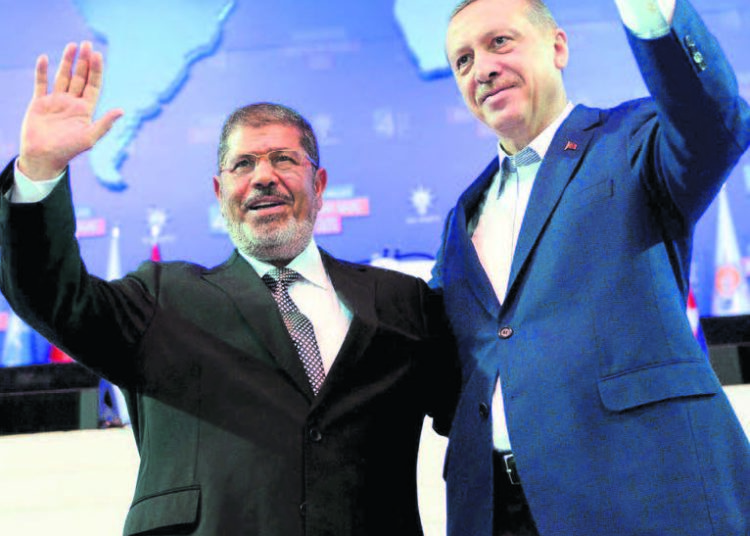Abdullah Bozkurt
The office of Turkish President Recep Tayyip Erdoğan predicted that the Muslim Brotherhood would make a huge comeback three to five years after the ouster of Mohamed Morsi by the Egyptian military amid popular protests on July 3, 2013.
According to secret wiretaps obtained by Nordic Monitor, Erdoğan’s chief of staff, Hasan Doğan, said “God willing, I predict that this [ouster of Morsi] will lead to an explosion, a bigger and more dynamic change in Egypt within three to five years.” The phone conversation took place on July 4, 2013, a day after Morsi was overthrown, laying out the fresh thinking in the private quarters of his boss, then-Prime Minister Erdoğan.
Doğan was talking to Osama Qotb, the nephew of Egyptian cleric Sayyid Qutb, a founder of the Muslim Brotherhood, who apparently had unhindered access to Erdoğan’s office. Both were lamenting the developments in Egypt, admitting how demoralized they were and trying to console each other.

Doğan drew a comparison between the ouster of Turkish political Islamists in the late ’90s and what happened to Morsi, claiming that Egypt’s Brotherhood would make a huge comeback just like the Islamists did under Erdoğan few years later. He was referring to the resignation of the late Prime Minister Necmettin Erbakan, the Turkish equivalent of a Muslim Brotherhood figure, from a coalition government in 1997 under pressure from the military. Erdoğan, who was mayor of Istanbul from Erbakan’s Islamist Welfare Party at the time, was also removed from office after a conviction and served a four-month prison term.
Transcript of the secret wiretap:
Erdoğan’s chief of staff explained that the ouster of the Islamists from the government was a blessing in a disguise as they were not ready to run the country. He noted that Morsi and the Muslim Brotherhood in Egypt were not ready, either, as they lacked control of the judiciary, the military and other government branches. “Now I see the same in Egypt. They had been thwarting the work of that man [Morsi], anyway. The poor guy had no army, no police, no governor, no municipality, no judiciary, nobody,” Doğan told Qotb.
The rest of the conversation was about Doğan setting up a private meeting with Qotb’s associates and Erdoğan on a development project in Istanbul that was planned to move forward with financing from Yasin al-Qadi, an Egyptian-born Saudi national who was at one time flagged by the US Treasury and the UN al-Qaeda sanction committee. Qotb had been representing Qadi’s business and personal interests in Turkey and was working closely with Erdoğan’s son Bilal. Doğan promised he would make the arrangements.

Turkey and Egypt have had troubled ties over the Erdoğan government’s support for the Muslim Brotherhood, and the Turkish president declared he did not recognize Egyptian President Abdel Fattah el-Sisi as the leader of a legitimate government.
The wiretap was authorized by the Istanbul 2nd High Criminal Court, which was looking into terror-related cases. The authorization was granted on June 19, 2013 as part of investigation file No. 2012/656.
Al-Qadi, Doğan and Erdoğan’s son Bilal were all leading suspects in an organized crime investigation pursued by prosecutors in Istanbul and were the subjects of detention warrants issued on December 25, 2013 by the prosecutors. However, Erdoğan stepped in, illegally preventing the execution of the warrants by ordering the police to ignore the prosecutor’s orders. After the removal of the prosecutors and police chiefs who were involved in their investigation, Erdoğan managed to whitewash the crimes of his associates.












